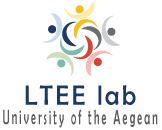Interdisciplinarity, Complexity and Systemic Approach in Education
In the LTEE Laboratory we are following the path from the social constructivism situated in learning and teaching mathematics, to the interdisciplinary approach of Didactics of Sciences and to the Systemic Approach of connections and interactions among learning agents and learning organizations, relating:
- separated cognitive frameworks using same symbolic/language with a variety of meaning and interactions
- actors and roles in apparently separated systems
- the complexities of the systems and of the systems interactions
Thus, in our preferred interdisciplinary and systemic approach of the complexity, at our Department, we are working to elaborate research instruments of Educational Engineering capable to be adapted in concrete situations so to operate as sensible and reflective regulators’ models on Didactic of Mathematics and Sciences and on Pedagogical Governance of Learning Organisations.
LTEE underlying work can be distinguished in three axes:
- Interdisciplinarity and Complexity (I-C) in Mathematics Education
- Educational Engineering and pedagogical governance of Educational Units
- Systemic approach of School Unit as a Learning Organization
Interdisciplinarity and Complexity (I-C) in Mathematics Education
Aiming at the development and the realization of Educational Programs for the learning of mathematics and sciences we valorise and use all the interdisciplinary and systemic interactions that affect the learning trip of the students to the construction of the sense and the meaning of scientific knowledge. We approach so, the complexity of the concrete situation and the exploration of the emerging learning capacities both of the students and of the school as learning organisations.
Numerous studies are published every year in the aforementioned area, focusing mainly on the elaboration of theoretical design models, development and evaluation of research instruments and their adaptiveness in concrete educational conditions in the areas of Mathematics and Science Education.
Educational Engineering and pedagogical governance of Educational Units
The field of Educational Engineering offers the theoretical and methodological tools that allow the systemic examination of phenomenologies in a learning organization and their interactions with connected systems of the family, the city-community context and the digital environment. It provides information that could lead to the development of reflective and adaptable regulations in concrete situations of teaching-learning activities as well as of pedagogical governance of an educational unit.
Systemic approach of School Unit as a Learning Organization
The approach of Educational Engineering in our laboratory comes from the concept of Ingenierie Didactique as developed in the frame of French Didactic of Mathematics. We have extended the reference to epistemological obstacles, psychological processes and didactical situations in the systemic approach of the diversity, interaction and complexity which characterize the functions and the roles in the school unit as learning organization as well as their impact in the socio-cognitive relations among the school unit and the family, the city-community and the digital environment.
Credits:
- The image of the home page connecting the LTEE lab Research Areas to the present page (“Interdisciplinarity, Complexity and Systemic Approach in Education”) is a drawing-print entitled “Birds” (44 x 32 cm) from the collection “After the Mouse”, 2008, of the Artist FLORENTIA IKONOMIDOU, Professor of the University of the Aegean [http://oikonomidou.wixsite.com/florentia-ikonomidou]
